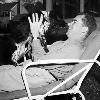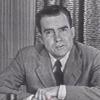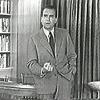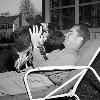

FE DA 080128checkers jpg Posted January 17 2008 Richard Nixon relaxing with his famous family dog Checkers Corbis Bettmann Tags: Checkers Speech View |
On September 23 1952 vice presidential candidate Richard M Nixon delivered what has become known as the Tags: Checkers Speech View |
1952 about 40 percent of the nation s homes had television sets and about 80 percent had radios It would be one of the first political uses of television to appeal directly to the populace Nixon standing in his studio made office during his Sept 1952 Checkers speech In the speech Nixon sat a desk with his wife Pat nearby seated in a parlor chair The camera focused Tags: Checkers Speech View |
|||||||||
1952 Vice Presidential candidate Richard Nixon with family dog Checkers among campaign gifts which Nixon sought to explain in his famous nationally televised September 1952 speech In Tags: Checkers Speech View |
The Checkers speech or Fund speech was an address made by United States Senator (United States Senate) from California and Republican (Republican Party (United States)) vice presidential candidate Richard Nixon on television and radio on September 23, 1952. Senator Nixon had been accused of improprieties relating to a fund established by his backers to reimburse him for his political expenses. With his place on the Republican ticket in doubt, he flew to Los Angeles and delivered a half-hour television address in which he defended himself, attacked his opponents, and urged the audience to contact the Republican National Committee (RNC) to tell it whether he should remain on the ticket. During the speech, he stated that regardless of what anyone said, he intended to keep one gift: a black-and-white dog which was named Checkers by the Nixon children, thus giving the address its popular name.
Nixon, as he related in his address, came from a family of moderate means, and had spent most of his time after law school either in the military, campaigning for office, or serving in Congress. After his successful 1950 Senate campaign, Nixons backers continued to raise money to finance his political activities. These contributions went to reimburse him for travel costs, postage for political mailings which he did not have franked (Franked mail#Franking Privilege), and similar expenses. Such a fund was not illegal at the time, but it exposed Senator Nixon, who had made a point of attacking government corruption, to charges he might be giving special favors to the contributors.
The press became aware of the fund in September 1952, two months after Nixons selection as General Dwight D. Eisenhowers running mate. Within a few days, the story grew until the controversy threatened Nixons place on the ticket. In an attempt to turn the tide of public opinion, Nixon broke off a whistle-stop tour of the West Coast and flew to Los Angeles to make a televised broadcast to the nation, for which television time was purchased by the RNC. Nixon got the idea for the Checkers reference from Franklin Roosevelts Fala speech (Fala (dog)#Fala speech)?given eight years to the day before Nixons address?in which Roosevelt mocked Republican claims that he had sent a destroyer to fetch his dog, Fala, when the dog was supposedly left behind in the Aleutian Islands.
Nixons speech was heard by about 60 million Americans, and led to an outpouring of public support for him; a huge majority of the millions of telegrams and phone calls received by the RNC and other political offices supported Nixon. He was retained on the ticket, which swept to victory in November 1952, keeping him on the path which would lead to his own election as President (President of the United States) 16 years later. The Checkers speech was an early example of a politician using television to appeal directly to the electorate, but has since sometimes been mocked or denigrated. "Checkers speech" has come more generally to mean any emotional speech by a politician.
Time: 6:30 p.m.
Place: Los Angeles, California




